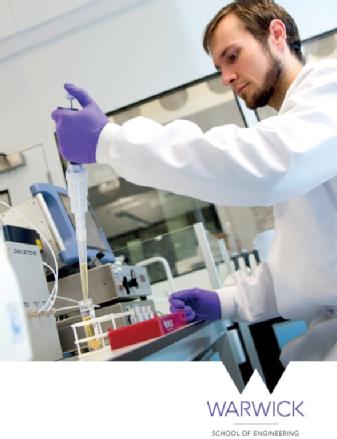Medical
One of the main focusses of the Biomedical Sensors Laboratory is the detection of gas-phase biomarkers emitted from human tissue. It is well established that the odours released from biological fluids carry information about the health of an individual. For thousands of years, doctors used to assess a patient by smell as part of the diagnostic process, a practice no longer undertaken in modern medicine. Today, advanced gas analysis technologies, such as the electronic nose, can be measure and identify these odours to provide insight into a patients health.
The Biomedical Sensors Laboratory is equipped to investigate a broad range of diseases and link them to odours from human waste. Our extensive test facilities, as described on the Facilities page, and approvals in place mean we are able to run almost any biological samples. We work closely with University Hospital Coventry and Warwickshire, our main collaborators, as well as the Royal Marston in London, Glenfield Hospital in Leicester and the Royal Hospital in Liverpool. We hold full ethical approval for many studies and are currently testing in excess of a thousand samples annually.
Our group undertakes chemical identification of biomarkers, testing with a variety of electronic nose instrumentation, and data analysis to calculate a range of statistical parameters. Since the establishment of the Biomedical Sensors Laboratory in 2011, we have investigated a large range of diseases using urine, breath, stool and swabs. Below is a list of some of the diseases we have studied along with the biological material used to identify relevant biomarkers. For further information on specific disease, please look at our list of publications.
Neurodegenerative Diseases:
- Alzheimer's disease (breath)
- Hepatic encephalopathy (breath)
Gastrointestinal Diseases:
- Bile acid malabsorption (urine)
- Coeliac's disease (urine)
- Crohns disease (breath, urine and stool)
- Irritable bowel syndrome (urine and stool)
- Ulcerative colitis (breath, urine and stool)
Cancers:
- Bladder cancer (urine)
- Colorectal cancer (urine)
- Pancreatic cancer (urine)
- Prostate cancer (urine)
Infectious Diseases:
- Clostridium difficile (stool)
- Covid-19 (breath)
- Respiratory tract Infection (breath)
- Sepsis, adult and paediatric (stool)
- Tuberculosis (breath)
- Urinary tract infection (urine)
- Vaginal infection (vaginal swabs)
- Wound infection (swabs)
Metabolic & Nutritional Conditions:
- Diabetes (urine)
- Malnutrition in children (stool)
- Obesity (urine)
Liver Conditions:
- Liver disease (urine and breath)
Reproductive & Obstetric Monitoring:
- Pre-term labour (vaginal wipe)
- Pelvic radiation recovery monitoring (stool)
